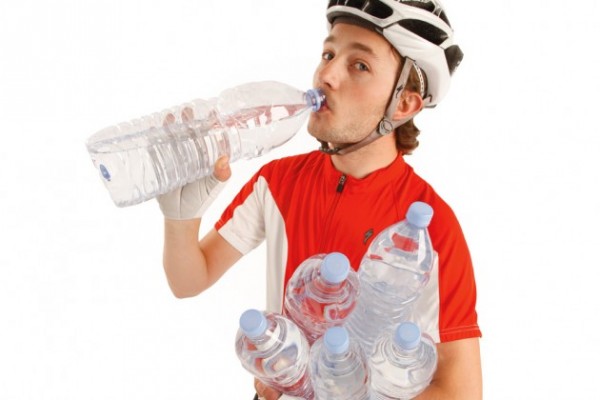I’ve written a few posts about how the “Gatorade Effect” is engrained in all athlete’s brains. I’ve heard Paul Sherwin say, while commentating, that a cyclist loses crazy power, up to 5% power for every 1% of body weight lose. I knew that number was just plain wrong.
I don’t drink much. Never have. Lots of times it on purpose. Losing water weight is losing weight. It doesn’t matter whether it is fat or water, one pound is one pound.
Now there is a study, although a small one (just 11 guys), that shows that losing up to 3% body weight doesn’t affect athletic performance at all. Nothing. Here is a link to the abstract.
The study was using 11 riders and they hooked up IV bags to the riders. Some of the bags were real and kept the riders hydrated and others were fake, not rehydrating the riders at all. They did this for psychological purposes.
They found out that there was no difference of power production with weight lose due to dehydration. That goes against everything we’ve been taught the last 30 years.
I’ve done my own experiments and have never had any positive results over hydrating. One year at the Professional Road Nationals in Philadelphia, we were staying in a nice hotel, right off the course. The hotel had a scale in the bathroom. I weighed myself right before leaving the room for the 160 mile road race. I was 158 lbs. It was super hot, in the 90’s and the same for the humidity.
I took bottles each lap, which was 10 miles and at the end, the last 10 miles of the race were the fastest of the day. I felt great at the end, easily riding over 30 mph in the field. So, I could produce normal power. I did okay, don’t remember exactly, but was feeling super after 6 hours.
I’m sure I drank some cold bottles after, maybe a beer or two. When I got back to the hotel room, I was 13 lbs light. I weighed 145 lbs. That is over a gallon and a half of water weight. And I was riding fine at the end. According to Paul Sherwin, I shouldn’t have been able to produce any wattage at all.
The same happened during MTB races. When the USOC was trying to figure out the right cut off number for hematocrit, they came to MTB races and did a lot of testing. Most of the riders were losing about 6-8 pounds of weight in a 2 1/2 hour MTB race. And we could all produce power at the end.
Marathon runners don’t drink much either while running. When they are grabbing those little Dixie cups, they aren’t getting much liquid into their bodies. Actually, a study of marathon runners in France in 2009 showed that athletes who lost a higher percentage of body weight through dehydration ran faster than those that lost less.
I’d like to see more studies like this. I go by the practice when you’re thirsty, drink. This is how all the rest of the animals on the planet do it. Not sure why it would be any different for us.






If water weight loss was so incapacitating, legitimate wrestling could not exist.
Good post, Steve. You might want to read some of Dr Timothy Noakes’s books and articles about this very issue.
Personally, I don’t worry about one day race hydration (well…maybe a little). Stage races present other issues of course.
…and then there is this: http://www.goldenpicklejuice.com/
There has also been a few studies on African runners, where not drinking water didn’t slow then down.
agree. check out noakes’ book “waterlogged”
Why am I so thirsty after reading this post?
Reminds me of this story: http://www.radiolab.org/story/91710-limits-of-the-body/
Paul Sherwin’s “up to 5% power for every 1% of body weight lose” was doublespeak to explain away Armstrong’s performance in a couple of stages of the ’03 Tour.
Evaporative sweating is the principal means of heat loss in warm-hot environments where sweat losses frequently exceed fluid intakes. When dehydration exceeds 3% of total body water (2% of body mass) then aerobic performance is consistently impaired independent and additive to heat stress. Dehydration augments hyperthermia and plasma volume reductions, which combine to accentuate cardiovascular strain and reduce V̇O2max. Importantly, the negative performance consequences of dehydration worsen as Tsk increases.
–
Cheuvront, S. N., R. W. Kenefick, S. J. Montain, and M. N. Sawka. “Mechanisms of Aerobic Performance Impairment with Heat Stress and Dehydration.” Journal of Applied Physiology 109.6 (2010): 1989-995. Web.
When I try to stay hydrated in a race the biggest difference I notice is that I have to deal with going to the back of the field to urinate. I mostly just try to drink enough to prevent my mouth from going dry.
One of the Science of Sports guys has done research into dehydration and performance as well. They have an interesting discussion of this in multiple posts on their site: http://sportsscientists.com/. But their conclusions are very similar to the Stephen Cheung, et al. results.
If hydration is so unimportant, then why do riders’ hematocrits seem to rise during a long stage race?
N=11 in this study makes it virtually worthless statistically.
As a competitive triathlete, I find my performances are the best when I drink according to thirst rather than some pre-arranged schedule (ex. sip every 15 minutes) or drink “X ounces per hour”, etc. The body operates differently each day and what worked yesterday may or may not work today.
A kidney expert recommends a truly KISS oriented principle: Drink when you’re thirsty: http://www.npr.org/2008/04/03/89323934/five-myths-about-drinking-water
Drink when you are thirsty, eat when you are hungry, sleep when you are tired. Life isn’t difficult, we just choose to make it so.
Spot on – the argument they make is there’s no effect, but having such a small sample size practically assures that the only effect they can find would have to be a very large effect.
Small sample sizes are practically the rule in sports science. So much of what we take as a given in sports is based on these sorts of small studies.
No, Paul Sherwen is just generally misinformed.
I used to run ultras. At Western States 100 miler, two doctors did a lot of testing, including weighing all runners throughout the race. Not much drop in performance until 5% drop in body weight, health problems like kidney failure after 10%.
Fellow Steve
Awesome things here. I am very satisfied to see your post.
Thanks a lot and I am having a look forward to
touch you. Will you please drop me a e-mail?